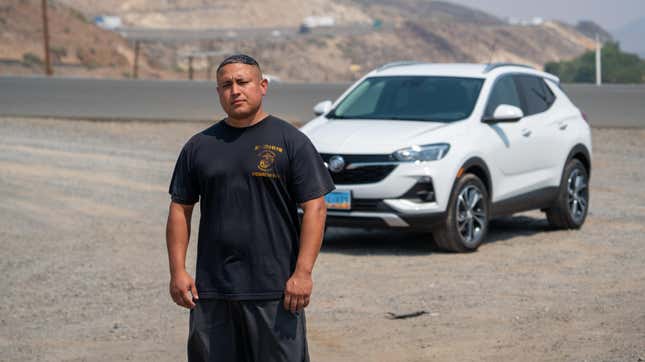
In late February, Stephen Lara was on his way from Texas to Northern California to visit his daughters. Along the way, he was stopped by a Nevada State Patrol trooper. The trooper offered a bizarre explanation for the stop, that he was just educating drivers about minor infractions they may not know they’re committing. But before it was over, Lara became another victim of civil asset forfeiture.
As the maddening story from the Washington Post reports, the trooper told Lara that he followed a tanker truck too closely right before passing it. But the officer eventually said that he was there to stop drugs, weapons and money from being smuggled across the border.
Lara — a former Marine with tours in Iraq in Afghanistan — told the trooper that he hadn’t done anything illegal, but that he did have a bunch of cash in the car. He doesn’t trust banks and instead keeps his cash at home with his parents in Texas. Lara even had receipts proving that the cash was all his. He took the cash along with him on that trip because he was planning to look for houses closer to his kids.
That didn’t stop the trooper from deciding to basically rob him blind, from Washington Post:
As he stood on the side of the road, police searched the vehicle, pulling nearly $87,000 in a zip-top bag from Lara’s trunk and insisting a drug-sniffing dog had detected something on the cash.
Police found no drugs, and Lara, 39, was charged with no crime. But police left with his money, calling a Drug Enforcement Administration agent to coordinate an “adoption,” which allows federal authorities to seize cash or property they suspect is connected to criminal activity without levying criminal charges.
“I left there confused. I left there angry,” Lara said in an interview with The Washington Post. “And I could not believe that I had just been literally robbed on the side of the road by people with badges and guns.”
Lara lawyered up with the Institute for Justice, which says that the money was his life savings.
Civil asset forfeiture is a scourge we’ve reported on a number of times, and the stories are always heartbreaking. Cops can take almost anything from you and keep it, even though you haven’t been charged with a crime.
Attorney General Eric Holder pumped the brakes on adoptive forfeiture a bit during the Obama administration, which made an impact before the Trump administration unraveled it, from the Washington Post:
After Holder banned the Justice Department from adopting local seizures — with exceptions for joint federal-local investigations and gun and child-porn crimes — such cases and their proceeds declined sharply, hitting a low of about $4.9 million in 2017, according to federal data analyzed by the Institute for Justice.
But that year, Sessions issued a directive reviving the practice.
In 2018, proceeds from forfeitures through adoptions not connected to a joint operation crept up to $19.6 million, according to the institute. They fell slightly, to $16.5 million, in 2019, the last year for which the institute says there is reliable data.
Biden’s Attorney General Merrick Garland has yet to do anything about civil asset forfeiture.
If it happens to you, getting your car and your cash back can be an uphill battle involving hiring a lawyer, filing a lawsuit and enduring a lengthy battle—just to get back something that shouldn’t ever have been taken from you in the first place. The DEA didn’t offer to give Lara his money back until he got a lawyer and spoke to the Washington Post.
He’s suing the Nevada Highway Patrol and has filed a court motion saying that the DEA didn’t have probable cause. He’s seeking a declaration that the seizure lacked probable cause and a restraining order barring the Nevada State Patrol from conducting adoptive forfeitures. His lawyer also intends to seek interest and payment on Lara’s costs.
Check out the rest of the Washington Post’s reporting on this story.